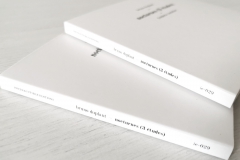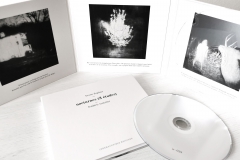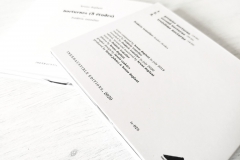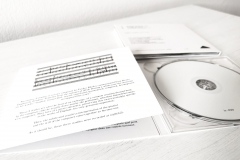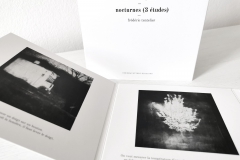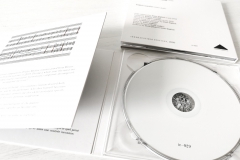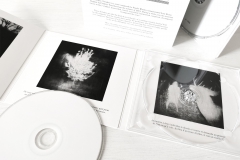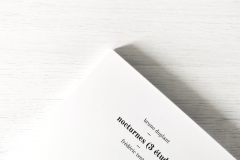Bruno Duplant – Nocturnes (3 Études)
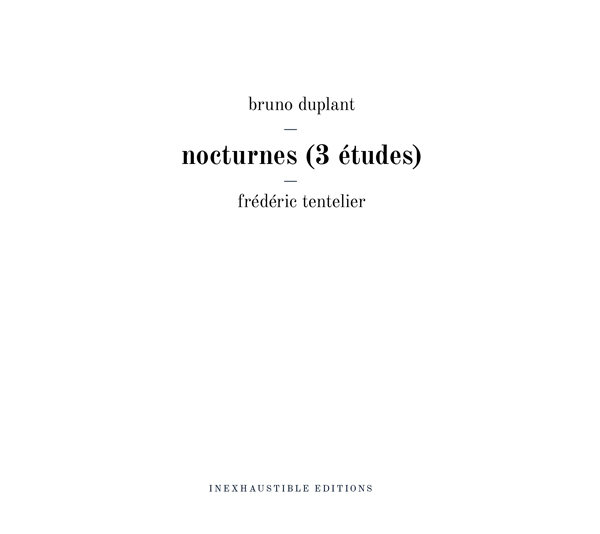
1. Premier Nocturne (19:00)
2. Second Nocturne (22:40)
3. Troisième Nocturne (16:20)
· Frédéric Tentelier: Fender Rhodes
Score composed by Bruno Duplant in July 2019
Realized by Frédéric Tentelier
Recorded by Frédéric Tentelier in July 2020
Edited, mixed and mastered by Bruno Duplant
Texts by Frédéric Tentelier
Photos by Bruno Duplant
Graphic design by László Szakács
Produced by László Juhász & Bruno Duplant
Released: August 2020 / first edition of 300 cds
Direct purchase: Bandcamp / Discogs
GALLERY ↓
REVIEWS ↓
“The Slovenian label Inexhaustible Editions continues to enrich its Composed Music Series, which together with Another Timbre’s releases represents an excellent viaticum for discovering the Wandelweiser collective and the contemporary reductionist aesthetics in general. After the collaborative album with the duo of Taku Sugimoto and Minami Saeki (Étendues Silencieuses, 2019), today is presented another original and fascinating project by Bruno Duplant: an artist both generous and of a strongly inclusive nature, whose works are conceived in close dialogue with their designated performer, thus elevated to the role of co-author.
The familiarity and sensitivity of the instrumentalist involved in relation to the post-Cagean poetics are therefore decisive: but while the dynamics of indeterminacy and free interpretation came into play especially with the pianist Reinier Van Houdt (Lettres et Replis, Elsewhere, 2019), in these ‘Nocturnes’ entrusted to Frédéric Tentelier the focus shifts on maintaining an atmosphere of ambiguous suspension, taking full advantage of the distinctive timbre of the Fender Rhodes electric piano, at once caressing and surreal, reassuring and sinister.
The domestic recording, made in July 2020 by Tentelier himself, demonstrates how little is necessary to completely change the perception of a space, the more or less sharp imaginative quality that every sonic instance inevitably brings with it: a common professional studio and a more circumscribed microphonation would have rendered these three long and pensive études somewhat similar to the generative suites of the later Brian Eno; instead, a series of discreet microsounds – an impalpable and constant room tone, a stool creaking under the weight of its guest – give concreteness and humanity to the overall picture, a two-tone watercolor with a gentle chiaroscuro effect.
Tentelier’s musical gesture feeds on darkness like the murkiest plots of Dostoevskij and Simenon, supports the interrogative phrases of the right hand with faint static tones, slowly consumes itself by means of its own ‘harmonies against the day’. Duplant’s nocturnes capture with subtle poignancy the intrinsic duality of the small hours, parentheses both of rest and of inexpressible restlessness, pages that only the half-asleep mind can fill.” / Michele Palozzo, Esoteros, 20 September 2020
“Nocturnes est un receuil de trois études composées pour l’artiste et musicien Frédéric Tentelier. Trois études réalisées sur un Fender Rhodes et enregistrées à domicile. Des fragments de mélodies lumineuses et des accords sombres s’enchevêtrent dans un jeu de résonances et de maintien des notes. L’impression laissée par ces trois pièces est celle d’une avancée timide, à petit pas, sans jamais savoir où l’on va mettre les pieds. Dans les territoires aigus, les notes sont souvent simples et épurées, tandis que les basses sont souvent des accords plus sombres et complexes avec des résonances supplémentaires inattendues, le tout joué à un tempo très lent. Ce qui fait la beauté de ces pièces et de cette longue traversée, c’est le maintien des notes qui fait que les mélodies glissent les unes sur les autres par moment, ou se frottent dans un battement harmonique à cause d’une résonance. On ne sait jamais trop dans quel territoire sonore on avance, si ça sera tendu, ou relaxé, ou en suspension.
Cette notion de suspension que l’on trouve dans le maintien des résonances, c’est aussi celle qui préside la temporalité de ces pièces. On avance lentement dans un paysage teinté de mélancolie ou de nostalgie (évidemment le timbre d’un Rhodes aide beaucoup à obtenir cet effet). Chaque évènement, chaque note, chaque mélodie semble flotter dans l’espace, tous les éléments sonores semblent suspendus à une temporalité autre, la temporalité d’un rêve, d’un souvenir, d’un désir. Le toucher délicat de Frédéric Tentelier, fait d’attaques minimes et très douces, de “sustains” surprenants, ainsi que l’enregistrement qui met en avant le déplacement des fréquences et leur modulation à travers l’espace ne font que renforcer ce sentiment de flottement et de suspension.
Et à propos d’enregistrement, il faut aussi souligner que ce dernier laisse apparaître les déplacements des fréquences dans l’espace, mais également la physicalité du performeur. On peut entendre divers cliquetis et quelques bruits qui laissent penser que tout a été réalisé en une prise unique, une prise éprouvante sans retour en arrière possible, et cette mise en avant du processus d’enregistrement et de réalisation de la performance ne fait qu’ajouter encore un peu de tension à ces trois pièces.
En résumé, voici 3 études où se marient à merveille la subtilité de la mise en forme, la précision de la réalisation, la poésie mélancolique de la composition, la tension inhérente à certaines fréquences, la physicalité du son et de la performance, sans oublier la beauté timbrale du Rhodes.” / Julien Héraud, Improv Sphere, 14 November 2020
“What did you do with your last year? The French multi-instrumentalist, composer, and playwright Frédéric Tentelier spent some of it getting well acquainted with a piece of music written for him by a friend. That friend is Bruno Duplant, a fellow Frenchman who has devised a number of pieces whose requirements generally correspond to what he knows that the recipients do.
One might surmise that Duplant thinks that Tentelier is a patient man. That’s certainly the most obvious quality of these three studies, each performed on a Fender Rhodes electric piano. They last between 16 and 22 minutes, and there’s not a hurried moment among them. Each movement gives life to a sound, and he seems as interested in savoring the span of that life as he is in initiating the next one. Each note or chord decays, sometimes fading into silence and sometimes sharing space with the next one. Duplant composed the piece in July 2019, and Tentelier didn’t get around to recording it until July 2020. During that time, according to the CD’s accompanying text, he ‘studied, transcribed, traced, translated, harmonized, composed, decomposed (and) recomposed the score’.
In other words, he got well enough acquainted to get beyond just playing the music. So, while it is possible to just play it quietly and let its pillowy ambience suffuse your space, the three studies are encoded with suggestions of consideration. The rests and decays, and the moments when two sounds co-exist, aren’t just sound events; they are traces of a long process of consideration. The record is like a published memoir, a palpable record of a personal process. The intimate recording quality, which incorporates the sounds of the performer shifting on his perch, imparts a feeling that you’re there in the room as his hands summon each squeezable, ringing tone. But it’s the pacing that communicates all the time that led up to that hour of performance.
Nocturnes (3 études) is not the only thing that Tentelier did in 2020. He also made some concrete pieces that explicitly respond to the months of severe lockdown, which you can find on his Bandcamp page. They’re harsher and more sonically diverse than this music, which invites supposition that the process of dealing with Duplant’s compositions might have been a grounding respite from the stresses of the time. Perhaps, if you likewise spend some time with this music, you’ll have your own ideas. If so, consider yourself a fellow custodian and co-interpreter of this music. For while you consider it, you’re extending its process and keeping it alive.” / Bill Meyer, Dusted Magazine, 27 January 2021
“It has been quiet from the Slovenian label Inexhaustible Editions (although, it might very well be possible some releases got lost in the mail). So, now I am looking at this bundle of new releases (which I may not all do this week) and what strikes me that they all look the same, design-wise. White digipacks, black lettering, minimalist design. Before committing these words to the screen, I played various of these to get an impression of what I was in for, and, more or less, deciding upon order, and it struck me that all of these work, again, more or less, with scores by composers, performed by others (though not always) and somehow could be loosely labelled as modern classical music. I started my journey with the work Noctures (3 Études), composed by Bruno Duplant and performed on a Fender Rhodes piano by Frédéric Tentelier. One of the reasons to start with this one is that I always love the sound of the Fender Rhodes piano. This is an electric piano, without strings but with thin metal tines and has a warm, slightly metallic sound with a beautiful sustain. This work is the result of a year in which Duplant ‘studied, transcribed, traced, translated, harmonized, composed, decomposed, recomposed the score’, which he did in close connection with Tentelier, who becomes the co-composer. The three pieces were recorded at nightfall (obviously!) and ooze a great tranquillity. There is quite a bit of silence between the notes, which arrive like mild raindrops. I am not sure if there are many repetitions in this piece; there seems to be individual notes and sometimes a few at a time, and very rarely forming a strict sequence or melody. It is all perfectly quiet music, the soundtrack before going to sleep, to contemplate the day that is now gone; or perhaps music to sleep by. The sustain of the sounds rings through in all three études and just before it cuts entirely a new note is played, which adds a most pleasurable continious listening experience to this album. Somehow, the word ‘melancholic’ sprang to mind.” / Frans de Waard, Vital Weekly, 20 April 2021
“This has been a review that took a lot of time in the making. Not because of the size of it, but because it really puzzled me and I encountered many obstacles in understanding the music. I truly believe that the listener must also work hard in order to digest and understand what goes on in a musician’s/composer’s mind. Many times the different interpretations are the ones that give certain value to musical works. But let’s start from the beginning a bit.
I’ve been a fan of Bruno Duplant’s work in the field of free improvisation. As a matter of fact some of his most original music from the late 00’s and early 10’s have been documented and reviewed on this site. I followed his slow transition from his earlier improvised works to scored music closer, or in a more descriptive manner, to traditional or classical European style. During this trajectory, Duplant never left improvisation entirely out of the big picture of his music. I believe that being a multi-instrumentalist allows him more info on how to evaluate the music.
The Fender Rhodes carries some recent jazz burden on its history. I’d comment that it’s a rather bold and risky move to incorporate this instrument on the three etudes that constitute the bulk of the CD. Nocturnes is realized by Frédéric Tentelier whose work in sound installations and theater performances has given him, I believe, the experience to act more as a performer and less as a musician. Any audio documentation has, by definition, the disadvantage that we can only listen and not watch or be close to the performer.
Tentelier has managed to present the three etudes in a way that it is as theatrical as it can be – considering the medium of the CD. He allows silence to take over sometimes; his touch on the keyboard distinguishes and highlights parts of the score. There’s a field recording quality on all three etudes (that last almost an hour) that certainly transport the listener out of the confined space that he or she is using to enjoy this CD.
The music is slow moving, esoteric and, at some points gave me the feeling of willing to de-compose what’s there from the original work in order to let the performer free to improvise and put his signature on the score. This mentality of open-minded experimentation borders with free improvisation and gives me, the listener, the feeling of an egalitarian project in progress between the composer and the performer.” / Fotis Nikolakopoulos, The Free Jazz Collective, 13 October 2021
“Speaking of Bruno Duplant, here he is again on this label with a new composition called Nocturnes (3 études) which was played on this occasion by Frédéric Tentelier on the Fender Rhodes electric piano. Duplant’s last release for this label was the somewhat perplexing Étendues Silencieuses which we received in 2019. On that item, Taku Sugimoto and Minami Saeki performed barely-audible skeletal tunes in the open air, their ultra-minimal contributions almost swept away on the breeze. Besides trying to engage with the thin content, what was equally bemusing for me was how nobody involved in the project seemed to know what it was about, why they were doing it, or even whether they’d actually done anything by the end. Duplant regarded all of these outcomes as indicators of a great success.
Today’s Nocturnes is only slightly more tangible, but it may simply be because of the way in which certain composers and musicians choose to discuss their work; Duplant seems benign enough, and knows what he’s doing, but he seems to speak in riddles, often quite short and compacted ones. When you compare that approach with the voluminous verbal and written outpourings of Stockhausen, a fellow who was very keen on making himself understood, Duplant’s latterday koans and cryptograms might seem a tad niggardly, but it may also indicate that he regards the content as something that needs to be protected; he composes as one curating rare butterflies or plants, unwilling to subject them to the cruel buffets of wordy descriptions. At any rate, it appears that Nocturnes came about as a very collaborative effort, as Tentelier wanted a piece to play on his piano and commissioned Duplant to do it. The composer is at great pains to stress the egalitarian nature of the working relationship, and without hesitation he dubs Tentelier a co-composer of the finished work. Matter of fact his general tone suggests he wouldn’t want to work any other way than with close friends like this.
Moreover, Duplant took about a year to deliver the goods; not that he was sitting idly, but there appears to have been a very active period of creation and revision at a very detailed level; he almost had to take it all apart once built, in order to reassemble it. If he’d been a watchmaker, you may have had to wait a bit longer for your timepiece, but you could be sure it would run for 25 years with a perfect motion, and probably never need winding either. All of this process has led to the ‘great coherence’ mentioned in the notes, and when you hear the finished work you should experience the welcome phenomenon of two souls becoming as one, so united are they in common aim and intent. Be prepared for slowly-decaying piano chords of unbearable sweetness, suspended in a white sea of contemplative silence or near-silence. There is also much visual poetry in Duplant’s three photographs reproduced here on the panels of the digipak, and the captions too – half Cocteau, half Duchamp, half Man Ray. And the format of the ‘Nocturne’ has a long tradition in classical music too.
As modernists go, Bruno Duplant doesn’t seem especially intent on junking history and alienating everyone who comes within reach, as say Boulez wanted to do (and did). Inside his cool, icy, minimal shell there beats the heart of a romantic.” / Ed Pinsent, The Sound Projector, 8 January 2022
RADIO PLAYS ↓
· Weeding at Dublin Digital Radio, Dublin, 6 September 2020
· Svaštarnica at Radio Študent, Ljubljana, 16 April 2016
· The Sound Projector Radio Show at Resonance FM, London, 21 January 2022

